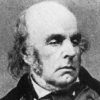People say that age creeps up on them quicker than they expected. First of all, who forced them to think that way? Does age creep up on adults more quickly than maturity creeps up on children? And again, would their age lie less heavily upon them if they were in their eight hundredth year rather than their eightieth? It doesn’t matter how much time has passed; a foolish old man can never be consoled or comforted.
[Obrepere aiunt eam citius, quam putassent. Primum quis coegit eos falsum putare? Qui enim citius adulescentiae senectus quam pueritiae adulescentia obrepit? Deinde qui minus gravis esset eis senectus, si octingentesimum annum agerent quam si octogesimum? Praeterita enim aetas quamvis longa cum effluxisset, nulla consolatio permulcere posset stultam senectutem.]Marcus Tullius Cicero (106-43 BC) Roman orator, statesman, philosopher
De Senectute [Cato Maior; On Old Age], ch. 2 / sec. 4 (2.4) [Cato] (44 BC) [tr. Cobbold (2012)]
(Source)
(Source (Latin)). Alternate translations:
All the folis seyn that olde age comyth in them sonner thenne they wend, but I demaunde a question of such men what maner foly constreyned them forto trowe or suppose the thyng the which is fals, for they can sey no reason how olde age entrith sonner in the man aftir adolescence no more than doeth adolescence aftir puerice callid chidlhode which is the seconde age, how be it that it is so ordeyned by nature that that one of the ages entrith aftir the ende of the othir. More ovir I demaunde such foolys how olde age shuld be lesse chargyng & lesse grevous to men if they myght lyve viii C yere, for how be it that the age past had be longer yit it may neithir comforte ne allege ne satisfye the foole olde man.
[tr. Worcester/Worcester/Scrope (1481)]
They say [old age] creepeth and stealeth upon them faster and sooner than they thought it would. First, who causeth them to imagine and think such a false and peevish untruth? for why should they think that after their youth and adolescency, old age creepeth faster upon them, rather than their adolescency and youth doth after childhood? Seeing therefore they do not repine nor complain any whit after that they have been children to grow up to be tall striplings and lusty young men, why should they be aggrieved or think themselves discontented, after they have been striplings and young men, to be old and aged? Again, if they might reach ot the age of eight hundreth years, what greater pleasure and commodity is therein, or wherein should they think it to be less troublesome and tedious than it is when they be of the age of four-score years? for the age that is once passed and gone, be it never so long, can with no manner of pleasure or delectation comfort, recreate nor mitigate the old age that is in such fond persons.
[tr. Newton (1569)]
They say that [age] creepeth upon them ere they are aware. First let me aske, who bade them over reckon themselves? for how much sooner doth age creep on youth, then youth on child-hood? then, how much more grievous would their age be to them, if they should as well live to the eight hundred year, as to the eighty year? for the former age (though long,) when it is past, can asswage a foolish old age, with no comfort.
[tr. Austin (1648)]
[They are] always complaining that [Old Age] stole upon them unawares. But pray whose fault is it, that they were so surprized by a wrong computation? Why may they not with equal reason exclaim, that their Youth came too quick upon their Childhood, as that Old Age stole upon their Youth? Or what reason have they to expect Old Age to be less burthensome at eight hundred, than at eighty? For the time they have passed, of what length soever it be, will administer no comfort to Old Age, if foolishly squandered away.
[tr. Hemming (1716)]
They charge Old Age with stealing on them faster than it was expected. Who constrain'd them to think wrongfully? Does not Age gain sooner on Youth, than Youth does on Childhood? Besides, How much easier would Old Age fit upon them, where they in their eight-hundredth Year, than in their eightieth? Because the Effluction of Time thro' several Æras,, can give no Comfort to us in these Years of Dotage.
[tr. J. D. (1744)]
But, oh! they say, [Old Age] has crept on us too fast, and overtaken us sooner than we thought or expected. In the first Place, pray who put them on thinking wrong? How can they say, Old Age creeps faster on Manhood, than Manhood succeeded Youth and Childhood? Or how would it sit lighter at the Age of Eight Hundred Years, if that were the Term of it, than at Eighty? For the longer Duration of the preceding Age, when once 'tis past, abates Nothing from the Effects of Old Age, when come; nor affords any Relief against the Follies and Weakness of such as sink under it.
[tr. Logan (1744)]
It is usual with men at this season of life to complain that old age has stolen upon them by surprise, and much sooner than they expected. But if they were deceived by their own false calculations, must not the blame rest wholly on themselves? For, in the first place, old age surely does not gain by swifter and more imperceptible steps on manhood, than manhood advances on youth ; and in the next, in what respect would age have sitten less heavily upon them, had its progress been much slower, and, instead of making his visit at fourscore years, it had not reached them till four hundred? For the years that are elapsed, how numerous soever they may have been, can by no means console a weak and frivolous mind under the usual consequences of long life.
[tr. Melmoth (1773)]
They say that [old age] steals upon them sooner than they had supposed. First, who compelled them to make a truthless supposition? For, what? Does old age steal upon adolescence sooner than adolescence upon boyhood? Then, how would old age be less onerous to them, if they were passing their eight-hundredth year than their eightieth? For the past life, however long, when it had run out, could sooth a foolish old age with no consolation.
[Cornish Bros. ed. (1847)]
They say that [old age] steals over them more quickly than they had supposed. Now, first of all, who compelled them to form a false estimate of its progress? for how does old age more quickly steal upon youth, than youth upon boyhood? Then, again, how would old age be less burdensome to them, if they were in their 800th year than in their 80th? for the past time, however long, when it had flowed away, would not be able to soothe with any consolation an old age of folly.
[tr. Edmonds (1874)]
They say that age creeps upon them faster than they had thought possible. In the first place, who forced them to make this false estimate? In the next place, how could old age be less burdensome to them if it came on their eight-hundredth year than it is in their eightieth? For the time past, however long, when it had elapsed, could furnish no comfort to soothe a foolish old age.
[tr. Peabody (1884)]
They say that [old age] is stealing upon them faster than they expected. In the first place, who compelled them to hug an illusion? For in what respect did old age steal upon manhood faster than manhood upon childhood? In the next place, in what way would old age have been less disagreeable to them if they were in their eight-hundredth year than in their eightieth? For their past, however long, when once it was past, would have no consolation for a stupid old age.
[tr. Shuckburgh (1895)]
They say that it has come with quicker step
Than they expected: pray, who was it then
Forced them to this illusion?
Did old age Come quicker upon youth, than youth itself
On childhood? Had it seemed a lighter load
If they had reached not to their eightieth year
But e'en to ten times that? For sure past years
Howe'er prolonged could ne'er endow with charm
A stupid old age.
[tr. Allison (1916)]
They say that [old age] stole upon them faster than they had expected. In the first place, who has forced them to form a mistaken judgement? For how much more rapidly does old age steal upon youth than youth upon childhood? And again, how much less burdensome would old age be to them if they were in their eight hundredth rather than in their eightieth year? In fact, no lapse of time, however long, once it had slipped away, could solace or soothe a foolish old age.
[tr. Falconer (1923)]
Old age, they protest, crept up on them more rapidly than they had expected. But, to begin with, who was to blame for their mistaken forecast? For age does not steal upon adults any faster than adulthood steals upon children. Besides, if they were approaching eight hundred instead of eight, they would complain of the burden just as loudly! If old people are stupid enough, then nothing can console them for the time that has gone by, however great its length.
[tr. Grant (1960, 1971 ed.)]
They complain that [old age] crept up on them faster than they had thought it would. To begin with, who compelled them to accept something that is patently untrue? How does old age “creep up on” adulthood any faster than adulthood does on childhood? In the second place, how would old age be less burdensome to these people if it were to come at age eight hundred instead of at age eighty? No matter how many years of life might have gone by, there could be no effective word of comfort for the old, if they were foolish and thoughtless.
[tr. Copley (1967)]
They also say old age creeps up on us more quickly than we thought it would. But tell me, just how does old age creep up on middle age any more quickly than middle age creeps up on youth? The length of time before the onset of old age is not the issue here. To those who think it is, a life in their 800th year would be just as bothersome as one in their 80th. No matter how long the past lasts, once it has gone, it is gone, and a past that has no other virtue than its length will offer no consolation for old age.
[tr. Gerberding (2014)]
Faster than they thought, they say,
Senility worms its way
Into them but who obliged them to
Hold such an imaginary view?
But how much faster in truth
Does old age encroach on youth
Than youth itself upon infancy?
And again how overbearing would old age be
Were one eight hundred years old rather than eighty?
Indeed no past life could, as a rule,
Soothe and cheer the old age of a fool.
[tr. Bozzi (2015)]
They say that old age crept up on them much faster than they expected. But, first of all, who is to blame for such poor judgment? Does old age steal upon youth any faster than youth does on childhood? Would growing old really be less of a burden to them if they were approaching eight hundred rather than eighty? If old people are foolish, nothing can console them for time slipping away, no matter how long they live.
[tr. Freeman (2016)]
They say that [old age] came upon them faster than they had expected. Who forced them to this false belief? For, who would claim that old age succeeded adolescence any faster than adolescence succeeded childhood? Would old age seem any less a burden to them if they were living their eight-hundredth year instead of their eightieth? Once an age has passed and flown away, no consolation is able to soften the blow of a feeble-minded senescence.
[tr. Robinson / @sentantiq (2017)]
Quotations about:
march of time
Note not all quotations have been tagged, so Search may find additional quotes on this topic.
All flesh is grass, and all its glory fades
Like the fair flower dishevell’d in the wind;
Riches have wings, and grandeur is a dream;
The man we celebrate must find a tomb,
And we that worship him, ignoble graves.
Old age was growing inside me. It kept catching my eye from the depths of the mirror. I was paralyzed sometimes as I saw it make its way for me so steadily when nothing inside me was ready for it.
Simone de Beauvoir (1908-1986) French author, existentialist philosopher, feminist theorist
Force of Circumstance [La Force de Choses], Part 1 ch. 4 (1963) [tr. Howard (1965)]
(Source)
At age 41.
To you and me
Life is not full; we see
The good days fly
And, ah, how grievously
Their sum doth mount,
Set all to our account;
Why dally we
Who know what life should be?[Nunc vivit necuter sibi, bonosque
Soles effugere atque abire sentit,
Qui nobis pereunt et inputantur.
Quisquam vivere cum sciat, moratur?]Martial (AD c.39-c.103) Spanish Roman poet, satirist, epigrammatist [Marcus Valerius Martialis]
Epigrams [Epigrammata], Book 5, epigram 20 (5.20.11-14) (AD 90) [tr. Pott & Wright (1921)]
The phrase pereunt et imputantur (they [the days] pass by, and are put to our account) is often found on sundials.
"To Julius Martialis." (Source (Latin)).
Alternate translations:
Now, to himself, alas! Does neither live,
But sees good suns, of which we are to give
A strict account, set, and march quick away:
Know a man how to live, and does he stay?
[tr. Cowley (1656)]
We behold the good suns shine, and pass away; lost are they for ever, yet, nevertheless, they are counted in our reckoning. Is it possible that anyone who knows how to live delays to live accordingly?
[tr. Amos (1858), ch. 3, #14; identified as ep. 21]
As it is, neither of us lives for himself, but sees his good days flee from him and vanish; days which are ever being lost to us, and set down to our account. Should any one, then, delay to live, when he knows how?
[tr. Bohn's Classical (1859)]
Now neither lives unto himself, alas!
And the good suns we see, that flash and pass
And perish; and the bell that knells them cries,
"Another gone: O when will ye arise?"
[tr. Stevenson (1884)]
Today neither lives for himself, and he feels the good days are flitting and passing away, our days that perish and are cored to our account. Does any man, when he knows how to live, delay?
[tr. Ker (1919)]
Now neither of us truly lives at all.
Suns rise and set and swell the reckoning. Say,
Does life mean anything? Then live today.
[tr. Francis & Tatum (1924), #230, "To His Cousin"]
Now neither lives his life, but he
Marks precious days that pass and flee.
These days are lost, but their amount
Is surely set to our account.
Knowledge the clue to life can give;
Then wherefore hesitate to live?
[tr. Duff (1929)]
But as things are now, neither one of us
Lives for himself, while ever glorious
Days slip by unlived, never to come
Again, deducted always from that sum
Allotted us. Why then do we not live,
We who know the joys that life can give?
[tr. Marcellino (1968)]
But as it is, we, both and each,
Miss the rich life within our reach,
We watch the good sun speed and set
And the lost day goes down as debt.
Would any man, if he knew how
To live, not do it here and now?
[tr. Michie (1972)]
Now, twin lives are not our own.
Our good suns flee & disappear,
Debited, as they die, to us.
Who hesitates that's learned to live?
[tr. Whigham (1987)]
We toil too much for others. Days
flicker by and then are billed,
one by one, to our accounts. Since we know
how, let's start really living now.
[tr. Matthews (1992)]
We feel our good days slip away and leave us; they are wasted, and put to our account. Does any man, knowing the way to live, defer it?
[tr. Shackleton Bailey (1993)]
Now neither lives
his life. We feel our good days flee,
Numbered and spent. Knowing the way
to live, why should a man delay.
[tr. McLean (2014)]
As it is now, neither of us lives for his own benefit, each of us can feel his best days slipping away and leaving us behind. They're gone, they've been debited from our account. What kind of person knows how to live, but keeps putting it off?
[tr. Nisbet (2015)]
Whether we wake or we sleep,
Whether we carol or weep,
The Sun with his Planets in chime,
Marketh the going of Time.Edward FitzGerald (1809-1883) English writer, poet, translator
“Chronomoros,” l. 33ff, Chambers’s Edinburgh Journal (5 Dec 1840)
(Source)
You can’t go back home to your family, back home to your childhood, back home to romantic love, back home to a young man’s dreams of glory and of fame, back home to exile, to escape to Europe and some foreign land, back home to lyricism, to singing just for singing’s sake, back home to aestheticism, to one’s youthful idea of “the artist” and the all-sufficiency of “art” and “beauty” and “love”, back home to the ivory tower, back home to places in the country, to the cottage in Bermuda, away from all the strife and conflict of the world, back home to the father you have lost and have been looking for, back home to someone who can help you, save you, ease the burden for you, back home to the old forms and systems of things which once seemed everlasting but which are changing all the time — back home to the escapes of Time and Memory.
Thomas Wolfe (1900-1938) American writer
You Can’t Go Home Again, Book 7 “A Wind Is Rising and the Rivers Flow” (1940)
(Source)
Every hour wounds. The last one kills.
Neil Gaiman (b. 1960) British author, screenwriter, fabulist
American Gods, epigraph (2001)
(Source)
Gaiman notes this as an "old saying." It is frequently found on sun dials or other clocks, sometimes in Latin. Variations:
- "All hours wound; the last one kills."
- "All the hours wound you, the last one kills."
- "They all wound; the last one kills."
- "Vulnerant omnes, ultima necat."
- "Omnes vulnerant. Postuma necat."
Thus times do shift, each thing his turn does hold;
New things succeed, as former things grow old.Robert Herrick (1591-1674) English poet
“Ceremonies for Candlemas Eve,” Hesperides, # 892 (1648)
(Source)













